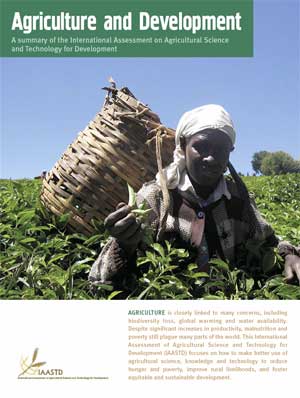Washington, DC, London, UK,
Nairobi, Kenya, New Delhi, India
April 15, 2008
|
 |
The way the world grows its food
will have to change radically to better serve the poor and
hungry if the world is to cope with a growing population and
climate change while avoiding social breakdown and environmental
collapse. That is the message from the report of the
International Assessment
of Agricultural Science and Technology for Development (IAASTD),
a major new report by over 400 scientists which is launched
today.
The assessment was considered by 64 governments at an
intergovernmental plenary in Johannesburg last week.
The authors' brief was to examine hunger, poverty, the
environment and equity together. Professor Robert Watson
Director of IAASTD said those on the margins are ill-served by
the present system: "The incentives for science to address the
issues that matter to the poor are weak... the poorest
developing countries are net losers under most trade
liberalization scenarios."
Modern agriculture has brought significant increases in food
production. But the benefits have been spread unevenly and have
come at an increasingly intolerable price, paid by small-scale
farmers, workers, rural communities and the environment.
It says the willingness of many people to tackle the basics of
combining production, social and environmental goals is marred
by "contentious political and economic stances". One of the
IAASTD co-chairs, Dr Hans Herren, explains: "Specifically, this
refers to the many OECD member countries who are deeply opposed
to any changes in trade regimes or subsidy systems. Without
reforms here many poorer countries will have a very hard time...
"
The report has assessed that the way to meet the challenges lies
in putting in place institutional, economic and legal frameworks
that combine productivity with the protection and conservation
of natural resources like soils, water, forests, and
biodiversity while meeting production needs.
In many countries, it says, food is taken for granted, and
farmers and farm workers are in many cases poorly rewarded for
acting as stewards of almost a third of the Earth’s land.
Investment directed toward securing the public interest in
agricultural science, education and training and extension to
farmers has decreased at a time when it is most needed.
The authors have assessed evidence across a wide range of
knowledge that is rarely brought together. They conclude we have
little time to lose if we are to change course. Continuing with
current trends would exhaust our resources and put our
children’s future in jeopardy.
Professor Bob Watson, Director of IAASTD said: “To argue, as we
do, that continuing to focus on production alone will undermine
our agricultural capital and leave us with an increasingly
degraded and divided planet is to reiterate an old message. But
it is a message that has not always had resonance in some parts
of the world. If those with power are now willing to hear it,
then we may hope for more equitable policies that do take the
interests of the poor into account.”
Professor Judi Wakhungu, said “We must cooperate now, because no
single institution, no single nation, no single region, can
tackle this issue alone. The time is now.”
Link:
http://www.greenfacts.org/en/agriculture-iaastd/ |
|